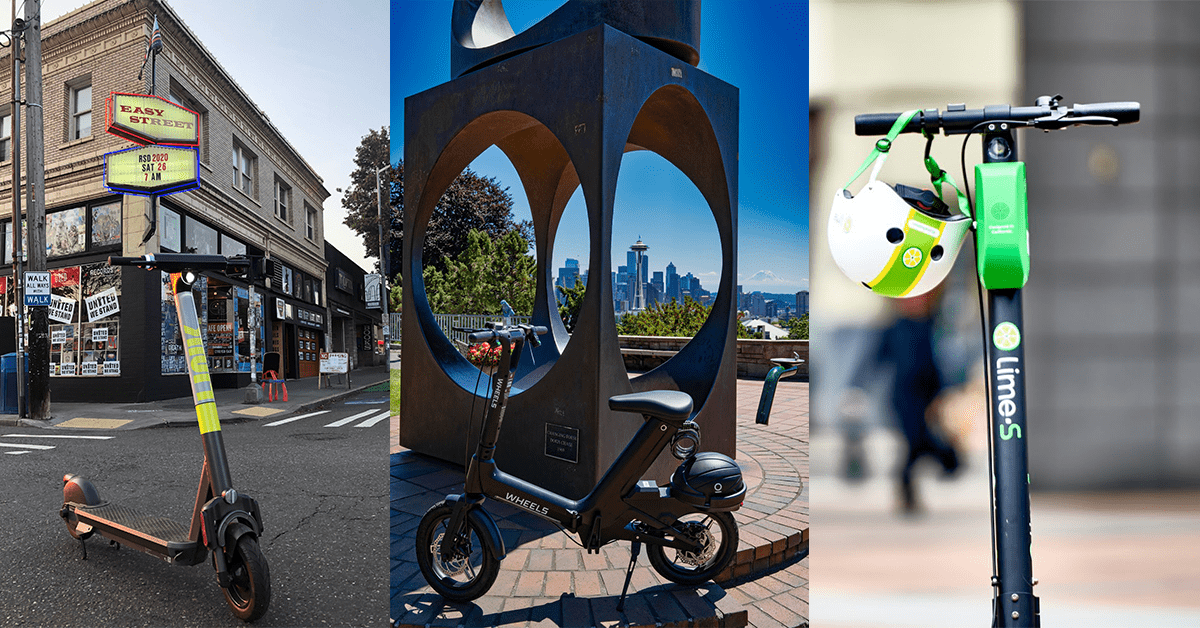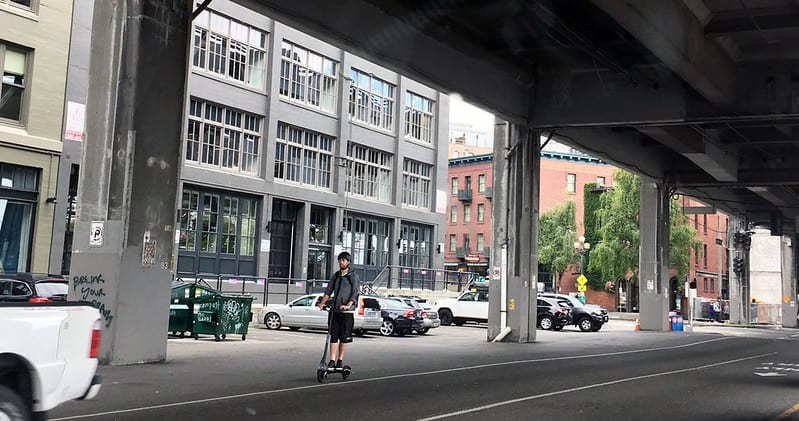 From right to left: LINK, Wheels, and Lime scooters. Photo Credit: LINK, Wheels, and Lime.
From right to left: LINK, Wheels, and Lime scooters. Photo Credit: LINK, Wheels, and Lime. Summary:
- As the weather is getting nicer, more people are using scooter share in Seattle.
- Friendly reminders:
- You can use scooter and bike share to cross the Spokane St Swing Bridge (low bridge).
- Scooter and bike share companies offer free or reduced rates for essential workers and people who are income-qualified.
- Properly park your scooter or bike so it doesn’t block a sidewalk, bus stop, building access, or curb ramp.
- Scoot safely! See tips below.
- Since we launched our scooter program last fall, scooter share companies have continued to innovate and improve their scooters. We’re accepting applications from scooter share companies to potentially bring a new scooter design to Seattle.
- We’re renewing our partnership with the local non-profit Outdoors for All to make adaptive bike rentals more accessible and give more recreation opportunities for people with disabilities.
Have you scooted around town on a LINK, Wheels, or Lime scooter share yet?
Last fall, we launched our scooter share pilot program, aiming to give Seattle residents and visitors another clean, healthy, and climate friendly transportation option.
Now, as the weather is warming and our days are getting longer, we’re seeing more scooters on the streets and more people taking rides. These scooters help people move about the city, connecting to transit and taking people to work, school, errands, restaurants, parks, or wherever they need to go.
For those of you needing to travel to/from West Seattle, remember that scooter share is a great way to cross the Spokane St Swing Bridge (low bridge).
The low bridge is open 24/7 to everyone walking, rolling, and riding bikes or scooters.
Seattle’s scooter and bike share rental companies offer free or reduced scooter and bike share rentals for essential workers and people who are income-qualified. LINK is also offering free scooter rides to COVID vaccine appointments. Please see our bike share or scooter share webpages for more information.

With more people riding, we want to take this opportunity to remind people of a few basic scooter share and bike share rules:
| DO | DON’T |
|---|---|
| Do park your scooter at a bike rack or the edge of the sidewalk near the street. | Don’t park your scooter blocking the sidewalk, at a bus stop, or blocking curb ramps or building entrances. |
| Do wear a mask and remember to wash/sanitize your hands before and after your ride! | Don’t ride your scooter on the sidewalk so that sidewalks can stay safe for all users. |
| Do ride your scooter in bike lanes, multi-use trails, or on streets with speed limits of 25 mph or slower. | Don’t ride your scooter in transit lanes or streets with a speed limit faster than 25 mph. |
The right way to park your bike or scooter: When you’re done with a trip, you should either park it next to a bike rack or on the outer edge of the sidewalk near the street (in line with trash cans, trees, and utility poles). Always leave at least six feet of space for people to get by.
If you park your shared bike or scooter in a way that blocks access, you’ll get an additional $20 fee tacked onto your ride. Our bike and scooter auditors are regularly on the streets issuing these fees that vendors are required to pass along to the last user of the device.
And as always, please remember to ride safely. That means wearing a helmet, following all traffic laws, and avoiding the sidewalk unless it is part of a bike path.
Since we launched our scooter program last fall, scooter share companies have continued to innovate and improve their scooters.
Some companies have new strategies to reduce the chance that a scooter is improperly parked or ridden on the sidewalk. Others have new designs that make scooters more stable and more accessible to people with disabilities. We predicted this continued innovation when we designed the program last spring. We reserved a fourth scooter share permit to be issued at a later date.
We’re currently exploring this option and have called for application submissions from scooter companies from across the US. If we see a submission that we think can improve our program, we’ll issue this final scooter permit next month for an operator who could bring an additional 1,000 devices to Seattle later this summer.

We’re renewing our partnership with the local non-profit Outdoors for All to make adaptive bike rentals more accessible and give more recreation opportunities for people with disabilities.
Outdoors for All works to enrich the quality of life for children and adults with disabilities through outdoor recreation.
Starting May 1, and running throughout the summer, our renewed partnership will again make all rentals of their adaptive cycles free for people with disabilities at Outdoors for All’s Adaptive Cycle Center in Magnusson Park. And, if COVID-19 restrictions allow, Outdoors for All will bring their fleet of adaptive cycles to Stay Healthy Streets and other events in South Seattle throughout the summer. Funding for this program comes from permit fees that bike and scooter share companies pay to operate in Seattle.
We’re thrilled to renew this fantastic partnership and to help make bike and scooter share more accessible for people with disabilities. Read about how this program gave Tyler the opportunity to explore Magnuson Park by bike.